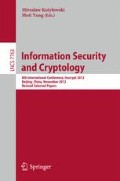Abstract
RCCA security is a weaker notion than CCA security, and has been proven to be sufficient for several cryptographic tasks. This paper adapts RCCA security to the most popular hybrid paradigms, KEM+DEM and Tag-KEM/DEM.
It is open to construct an RCCA-secure scheme more efficient than CCA-secure ones. In the setting of Tag-KEM, we solve this by presenting a natural RCCA-secure RSA-based Tag-KEM scheme, named as RSA-TKEM, which is more efficient than all existing methods for constructing a CCA-secure RSA-based Tag-KEM scheme.
Unfortunately, combining our RSA-TKEM with passive secure one-time pad following Tag-KEM/DEM paradigm yields an RCCA-insecure hybrid encryption. This shows passive security of DEM is not sufficient now, and Tag-KEM/DEM looses its advantage over KEM+DEM. In spite of this and for completeness, we show RCCA secure DEMs are still sufficient to achieve RCCA-secure hybrid encryptions by following Tag-KEM/DEM.
In addition, we show RCCA-secure KEM is sufficient for achieving CCA-secure hybrid encryptions. This is done by introducing a new hybrid paradigm, named as KEM/Tag-DEM, where the ciphertext of KEM is used as a tag for Tag-DEM scheme rather than reversely in Tag-KEM/DEM, so that the security of KEM can be weakened to RCCA one. Tag-DEMs can be constructed as efficiently as DEMs, so RCCA-secure KEMs more efficient than CCA-secure ones become more appealing.
Access this chapter
Tax calculation will be finalised at checkout
Purchases are for personal use only
Preview
Unable to display preview. Download preview PDF.
References
Abe, M., Cui, Y., Imai, H., Kurosawa, K.: Tag-KEM from Set Partial Domain One-Way Permutations. In: Batten, L., Safavi-Naini, R. (eds.) ACISP 2006. LNCS, vol. 4058, pp. 360–370. Springer, Heidelberg (2006)
Abe, M., Gennaro, R., Kurosawa, K.: Tag-KEM/DEM: A new framework for hybrid encryption. Cryptology ePrint Archive: Report 2005/027 (2005)
Abe, M., Gennaro, R., Kurosawa, K., Shoup, V.: Tag-KEM/DEM: A new framework for hybrid encryption and a new analysis of Kurosawa-Desmedt KEM. In: Cramer, R. (ed.) EUROCRYPT 2005. LNCS, vol. 3494, pp. 128–146. Springer, Heidelberg (2005)
Abe, M., Gennaro, R., Kurosawa, K., Shoup, V.: Tag-KEM/DEM: A new framework for hybrid encryption. J. Cryptology 21(1), 97–130 (2008)
An, J.H., Dodis, Y., Rabin, T.: On the security of joint signature and encryption. In: Knudsen, L.R. (ed.) EUROCRYPT 2002. LNCS, vol. 2332, pp. 83–107. Springer, Heidelberg (2002)
Bellare, M., Desai, A., Pointcheval, D., Rogaway, P.: Relations among notions of security for public-key encryption schemes. In: Krawczyk, H. (ed.) CRYPTO 1998. LNCS, vol. 1462, pp. 26–45. Springer, Heidelberg (1998)
Bellare, M., Desai, A., Jokipii, E., Rogaway, P.: A concrete security treatment of symmetric encryption: analysis of the DES modes of operation. In: Proceedings of the 38th Symposium on Foundations of Computer Science, pp. 394–403. IEEE Press (1997)
Bellare, M., Rogaway, P.: Random oracles are practicala paradigm for designing efficient protocols. In: Proceedings of the First Annual Conference on Computer and Communications Security, pp. 62–73. ACM, New York (1993)
Bellare, M., Namprempre, C.: Authenticated encryption: Relations among notions and analysis of the generic composition paradigm. In: Okamoto, T. (ed.) ASIACRYPT 2000. LNCS, vol. 1976, pp. 531–545. Springer, Heidelberg (2000)
Canetti, R., Krawczyk, H., Nielsen, J.: Relaxing chosen-ciphertext security. In: Boneh, D. (ed.) CRYPTO 2003. LNCS, vol. 2729, pp. 565–582. Springer, Heidelberg (2003)
Cramer, R., Shoup, V.: Design and analysis of practical public-key encryption schemes secure against adaptive chosen ciphertext attack. Manuscript (December 17, 2001); SIAM Journal of Computing 33(1), 167–226 (2003)
Dent, A.W.: A designer’s guide to KEMs. In: Paterson, K.G. (ed.) Cryptography and Coding 2003. LNCS, vol. 2898, pp. 133–151. Springer, Heidelberg (2003)
Groth, J.: Rerandomizable and replayable adaptive chosen ciphertext attack secure cryptosystems. In: Naor, M. (ed.) TCC 2004. LNCS, vol. 2951, pp. 152–170. Springer, Heidelberg (2004)
Hofheinz, D., Kiltz, E.: Secure Hybrid Encryption from Weakened Key Encapsulation. In: Menezes, A. (ed.) CRYPTO 2007. LNCS, vol. 4622, pp. 553–571. Springer, Heidelberg (2007)
Krawczyk, H.: The order of encryption and authentication for protecting communications (or: How secure is SSL?). In: Kilian, J. (ed.) CRYPTO 2001. LNCS, vol. 2139, pp. 310–331. Springer, Heidelberg (2001)
Kurosawa, K., Desmedt, Y.: A new paradigm of hybrid encryption scheme. In: Franklin, M. (ed.) CRYPTO 2004. LNCS, vol. 3152, pp. 426–442. Springer, Heidelberg (2004)
Prabhakaran, M.M., Rosulek, M.: Rerandomizable RCCA Encryption. In: Menezes, A. (ed.) CRYPTO 2007. LNCS, vol. 4622, pp. 517–534. Springer, Heidelberg (2007)
Rogaway, P.: Authenticated-Encryption with Associated-Data. In: Proceedings of the 9th Annual Conference on Computer and Communications Security (CCS-9), pp. 98–107. ACM, New York (2002)
Rogaway, P., Shrimpton, T.: Deterministic Authenticated-Encryption: A Provable-Security Treatment of the Key-Wrap Problem. Full version of: A Provable-Security Treatment of the Key-Wrap Problem. In: Vaudenay, S. (ed.) EUROCRYPT 2006. LNCS, vol. 4004, pp. 373–390. Springer, Heidelberg (2006)
Shoup, V.: ISO 18033-2: An emerging standard for public-key encryption, committee draft (2004), http://shoup.net/iso/
Author information
Authors and Affiliations
Editor information
Editors and Affiliations
Rights and permissions
Copyright information
© 2013 Springer-Verlag Berlin Heidelberg
About this paper
Cite this paper
Chen, Y., Dong, Q. (2013). RCCA Security for KEM+DEM Style Hybrid Encryptions. In: Kutyłowski, M., Yung, M. (eds) Information Security and Cryptology. Inscrypt 2012. Lecture Notes in Computer Science, vol 7763. Springer, Berlin, Heidelberg. https://doi.org/10.1007/978-3-642-38519-3_8
Download citation
DOI: https://doi.org/10.1007/978-3-642-38519-3_8
Publisher Name: Springer, Berlin, Heidelberg
Print ISBN: 978-3-642-38518-6
Online ISBN: 978-3-642-38519-3
eBook Packages: Computer ScienceComputer Science (R0)

